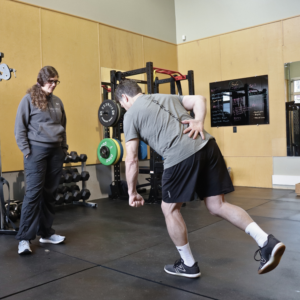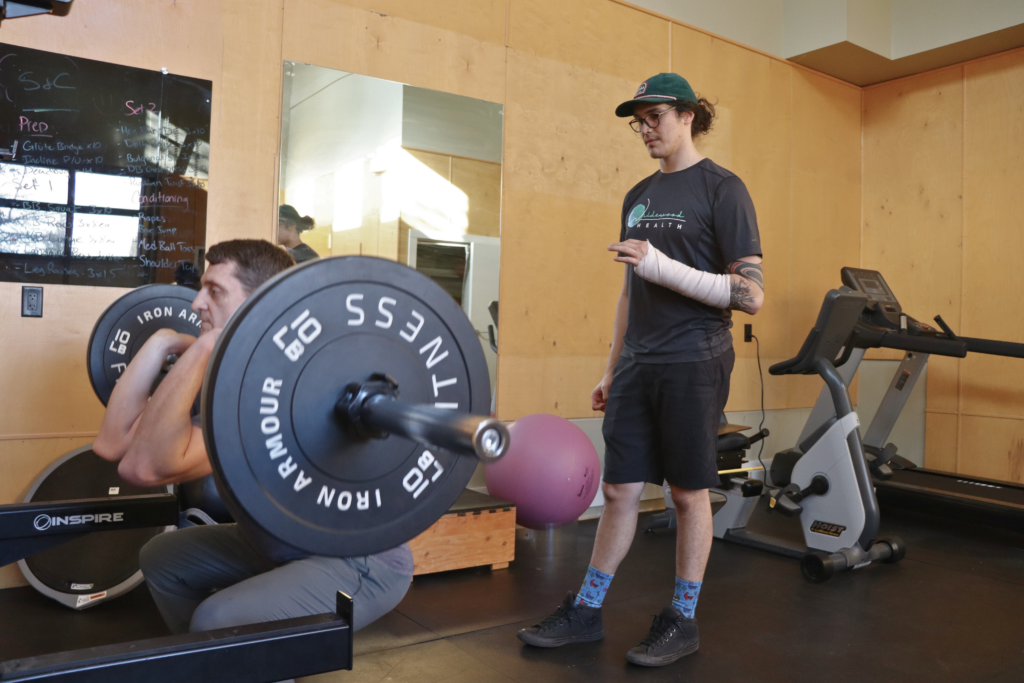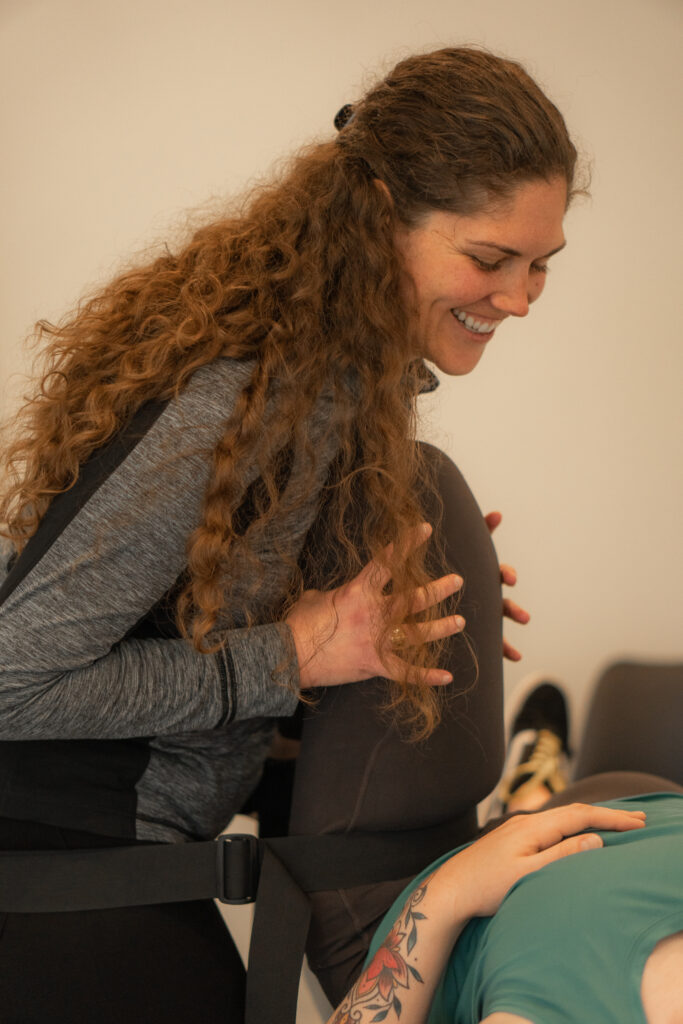1. What is Kinesiology?
Kinesiology is the scientific study of human movement, performance and function and may also be referred to as ‘human kinetics’. The practice of kinesiology applies the science of anatomy, physiology, biomechanics, psychology and neuroscience to human movement and function. Kinesiology employs evidence-based scientific research and assessment to assist in the prevention and rehabilitation of injury, lifestyle diseases and other physiological conditions, along with the enhancement of human performance, in environments such as work and sport.
2. Who are Kinesiologists?
Kinesiologists (also referred to as “kinesiotherapists” or “kinesiologues” in other regions of Canada and Quebec) are “human movement specialists”. Kinesiologists provide unique and valuable services contributing to your health care and treatment.
3. Kinesiologists can work with you to:
- prevent and treat illness or injury through appropriate exercise testing, assessment and prescription;
- improve your physical performance in sport, work and activities of daily living;
- oversee or assist with the implementation of your individual health care plan;
- assess workplace demands and provide workplace design services (ergonomics) to help prevent and/or recovery from injury; and
- provide support in rehabilitation and wellness management.

4. What are the Areas of Practice of Kinesiologists?
- Health and Fitness – Kinesiologists design and conduct health and wellness programs for all age groups, teach and organize courses and workshops in health promotion, including general fitness, sport performance, athletic training, human nutrition and general issues related to a person’s physical well-being.
- Injury Assessment and Rehabilitation – Kinesiologists provide functional assessment and treatment services for the rehabilitation of people suffering from physical injuries sustained at work, in automobile collisions, in sports and other life activities.
- Exercise Therapy – Kinesiologists provide exercise and lifestyle-based services to enhance the lives of those suffering from chronic diseases or physical and neurological injuries, such as diabetes, heart disease, lung disease, cancer, multiple sclerosis, autism spectrum disorder, osteoporosis, arthritis, and traumatic brain injury.
- Disability Management – Kinesiologists proactively assist clients by planning and arranging services to facilitate a safe return to work and to improve other activities of daily living. In cases where a return to work is not possible, we assist in determining the level of impairment and job retraining required.
- Biomedical Technology and Research – Kinesiologists provide gait analysis services to assist with footwear selection and orthotic fitting, along with assistance selecting and fitting bracing products, typically for the foot, ankle, knee, hip, shoulder, elbow and wrist. Many kinesiologists also serve as sales representatives for biomedical technology companies and conduct research for private companies, universities, non-profit or government agencies related to the interaction of the human body with the environment.
5. What Other Areas Can Kinesiologists Support you In?
- Active Health and Fitness to Improve Mental Health & Support Addiction Recovery – Kinesiologists develop customized programs to improve mental health by improving fitness, focus and energy through exercise prescription and therapy. Increased activity can reduce depression and stress, and help you better manage your mental health. Exercise therapy can also provide necessary support for addiction recovery by providing healthy coping mechanisms that will make you feel better, heal your body, improve sleep and provide you with needed structure and routine.
- Performance Coaching – Kinesiologists work with athletes to recover from injury, to prevent injury, or to improve overall or specific performance. They provide the knowledge and skills to analyze the areas for improvement or recovery and build a plan with you to help you meet the challenges you face.
- Support for Seniors to Maintain Active Health, Mental Health & Fitness – Kinesiologists work with seniors to develop customized programs to improve and maintain mobility, health and well-being during their golden years. They help you build physical activity into your routine to prevent disease, such as lung and heart disease; to manage chronic pain (e.g. from arthritis) and conditions such as diabetes and Parkinson’s disease; to reduce the risk of falls; and to improve cognitive functional and mental health.
- Ergonomics, Workplace Analysis and Design – Kinesiologists provide physical demands analysis in the workplace to reduce and prevent the occupational risk of musculoskeletal injuries. They identify and assess risk factors and analyze, design, or adapt workplace conditions to reduce injury risk and develop activities for daily living (ADL) retraining as required.

6. What is Exercise Physiology?
Exercise physiology focuses on how the body responds and adapts to exercise and physical activity, including topics like cardiovascular health, muscle function, and energy metabolism.
7. How does Biomechanics Relate to Kinesiology?
Biomechanics is the study of the mechanical aspects of human movement, including forces, torques, and joint movements. It helps analyze and improve athletic performance and prevent injuries.
8. What is Motor Control in Kinesiology?
Motor control is the study of how the nervous system coordinates and controls muscle movements, including topics like coordination, skill acquisition, and motor learning.
9. What role does sports psychology play in kinesiology?
Sports psychology explores the psychological aspects of sports and physical activity, including motivation, performance anxiety, and mental preparation.
10. How can kinesiology be applied to prevent sports injuries?
Kinesiologists can design exercise programs, analyze movement patterns, and provide rehabilitation to help athletes prevent and recover from injuries.
11. What is the importance of exercise in kinesiology?
Exercise is a fundamental aspect of kinesiology, as it is used to promote health, enhance physical performance, and manage various medical conditions.

12. What educational requirements are needed to become a kinesiologist?
To become a kinesiologist, you typically need at least a bachelor’s degree in kinesiology or a related field. Advanced degrees (master’s or Ph.D.) may be required for specific careers or research positions.
13. Are there certifications or licenses required for kinesiologists?
Certification requirements vary by location and specialization. Some kinesiologists may need certifications in areas like personal training, physical therapy, or athletic training, depending on their chosen career path.
14. Can kinesiology be used in rehabilitation?
Yes, kinesiology is often used in physical therapy and rehabilitation settings to help individuals recover from injuries or surgeries, regain mobility, and improve overall function.
15. What research areas are currently emerging in kinesiology?
Emerging research areas in kinesiology include the use of technology (e.g., wearables and virtual reality) in sports and exercise, personalized fitness programs, and the impact of physical activity on mental health.
These are some common questions related to kinesiology, but the field is vast and continually evolving, so there are many more specialized topics and areas of interest within it.






